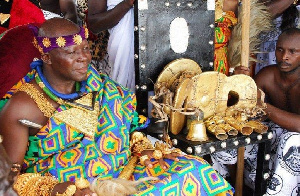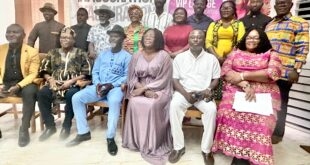Over 300 years ago, Okomfo Anokye, the priest or traditional healer of the Ashanti empire, who was then a friend and advisor of Osei Tutu (the Ashanti king at the time), called a meeting of all the heads of each Ashanti clan. The agenda was to unite under one of the chiefs whose stool would be greater than all the other stools, and any chief enstooled by any of the states was to swear the oath of allegiance to him.
Oral history has it that the meeting was also Osei Tutu’s carefully thought-out plan to overthrow the Denkyira, a neighboring kingdom and a highly developed Akan state that was quickly growing and gaining dominance over other southern states in the 16th and 17th centuries. During the meeting, Okomfo Anokye conjured a mysterious golden stool from the heavens which landed on Osei Tutu’s lap, meaning that he had been chosen by the ancestors and the gods as the “unquestionable king of the kings of the Asante Nation.”
Okomfo Anokye told the chiefs that the gold stool contained the spirit and soul of the Asante Nation. Osei Tutu took the oath of allegiance to the Golden Stool and all the chiefs took an oath of allegiance to Osei Tutu and the oath never to raise arms against the Golden Stool. That was the beginning of the Asante Kingdom (or the Ashanti Kingdom). Osei Tutu was, therefore, made the first King of the Asante Kingdom. The Asantes would later go to war against the dominant neighboring kingdom, Denkyira, in 1699 and would succeed with the help of Okomfo Anokye.
As a symbol of nationhood, and because it contains the soul of the Asante, the Golden Stool is considered to be so sacred that no person whatsoever is allowed to sit on it. It is kept under tight security and is taken outside only on exceptionally grand occasions such as the Akwasidae festival.
The Akwasidae festival of the great Ashanti Kingdom which commemorates the time that the Ashanti Golden Stool was magically brought down from heaven and worships ancestral spirits is celebrated once every six weeks on a Sunday. Occupying a significant place on the traditional calendar of the Asante, every paramount chief in Asanteman (Ashanti Kingdom) in Ghana’s city of Kumasi observes the day in his own jurisdiction, however, the main event is held at the Manhyia Palace. There, the Asantehene (Ashanti king) sits in state for his subjects and other visitors to pay him homage.
The Asantehene, Otumfuo Osei Tutu II, arrives at the palace or festival grounds in a palanquin. Other chiefs, courtiers and members of his security detail follow. In front of chiefs and queen mothers presided over by the Asantehene, ministers of State, political party representatives, MPs, the business community and international visitors as well as the people of Asanteman is a display of rich Asante culture including dancing, drumming from different cultural bands and firing of muskets. Colorful brands of Kente cloth are also showcased during the durbar held in the Asantehene’s honor.
The Akwasidae is essentially an occasion to strengthen the independence of the Ashanti people and to re-affirm the loyalty of each state to the confederacy that came into being following the Ashanti war of independence fought against the Denkyira. In other words, the festival is to affirm loyalty to the occupant of the Golden Stool, that is, the Asantehene.
The Golden Stool which is believed to be housing the spirit of the Ashanti nation — living, dead and yet to be born — is a curved seat 46 cm high with a platform 61 cm wide and 30 cm deep. Its entire surface is inlaid with gold and hung with bells to warn the king of impending danger. At Akwasidae, the Asantehene sits in close proximity to the installed Golden Stool.
Note that Akwasidae comes into two parts. Besides the public celebrations, there are what various accounts have described as “solemn private ceremonies” performed by members of the royal family at the king’s palace chambers. There are rituals to cleanse the spirit of the king and the offering of ceremonial meals like mashed yam and strong drinks to ancestral spirits whose blessings are needed to guide the affairs of the kingdom. There is also the purification of “black, ancestral, hand-carved stools” to pay homage to dead kings, according to this report.
All in all, Akwasidae is a moment to learn new history, get connected with one’s roots, strengthen traditional bonds, and unite for the betterment of society. This month’s Akwasidae was held over the weekend together with the Olu of the Warri Kingdom, Nigeria, Ogiame Atuwatse III at the Manhyia Palace. The Olu of Warri Kingdom’s visit to Asanteman was to strengthen the union between the two kingdoms as well as to congratulate the Asantehene on his 23rd enstoolment on the Golden Stool, the Manhyia Palace said.
The Adae Kese Festival is the last Akwasidae of the year. It is usually held with donations sent to the poor and the needy.
Source: face2faceafrica.com
 Home Of Ghana News Ghana News, Entertainment And More
Home Of Ghana News Ghana News, Entertainment And More





